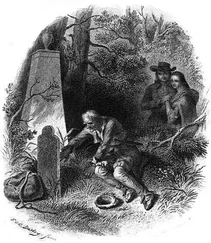“This is so true, Deerslayer,” returned Judith, “that now all is ready, we may proceed at once, boldly, and without the fear of being followed; else we shall be behind our time.”
“No, no; the matter needs management; for, though the savages are in the dark as to Chingachgook and the rock, they’ve eyes and legs, and will see in what direction we steer, and will be sartain to follow us. I shall strive to baffle ‘em, howsever, by heading the scow in all manner of ways, first in one quarter and then in another, until they get to be a-leg-weary, and tired of tramping a’ter us.”
So far as it was in his power, Deerslayer was as good as his word. In less than five minutes after this speech was made, the whole party was in the ark, and in motion. There was a gentle breeze from the north, and boldly hoisting the sail, the young man laid the head of the unwieldy craft in such a direction, as, after making a liberal but necessary allowance for leeway, would have brought it ashore a couple of miles down the lake, and on its eastern side. The sailing of the ark was never very swift, though, floating as it did on the surface, it was not difficult to get it in motion, or to urge it along over the water at the rate of some three or four miles in the hour. The distance between the castle and the rock was a little more than two leagues. Knowing the punctuality of an Indian, Deerslayer had made his calculations closely, and had given himself a little more time than was necessary to reach the place of rendezvous, with a view to delay or to press his arrival, as might prove most expedient. When he hoisted the sail, the sun lay above the western hills, at an elevation that promised rather more than two hours of day; and a few minutes satisfied him that the progress of the scow was such as to equal his expectations.
It was a glorious June afternoon, and never did that solitary sheet of water seem less like an arena of strife and bloodshed. The light air scarce descended as low as the bed of the lake, hovering over it, as if unwilling to disturb its deep tranquillity, or to ruffle its mirror-like surface. Even the forests appeared to be slumbering in the sun, and a few piles of fleecy clouds had lain for hours along the northern horizon like fixtures in the atmosphere, placed there purely to embellish the scene. A few aquatic fowls occasionally skimmed along the water, and a single raven was visible, sailing high above the trees, and keeping a watchful eye on the forest beneath him, in order to detect anything having life that the mysterious woods might offer as prey.
The reader will probably have observed, that, amidst the frankness and abruptness of manner which marked the frontier habits of Judith, her language was superior to that used by her male companions, her own father included. This difference extended as well to pronunciation as to the choice of words and phrases. Perhaps nothing so soon betrays the education and association as the modes of speech; and few accomplishments so much aid the charm of female beauty as a graceful and even utterance, while nothing so soon produces the disenchantment that necessarily follows a discrepancy between appearance and manner, as a mean intonation of voice, or a vulgar use of words. Judith and her sister were marked exceptions to all the girls of their class, along that whole frontier; the officers of the nearest garrison having often flattered the former with the belief that few ladies of the towns acquitted themselves better than herself, in this important particular. This was far from being literally true, but it was sufficiently near the fact to give birth to the compliment. The girls were indebted to their mother for this proficiency, having acquired from her, in childhood, an advantage that no subsequent study or labor can give without a drawback, if neglected beyond the earlier periods of life. Who that mother was, or rather had been, no one but Hutter knew. She had now been dead two summers, and, as was stated by Hurry, she had been buried in the lake; whether in indulgence of a prejudice, or from a reluctance to take the trouble to dig her grave, had frequently been a matter of discussion between the rude beings of that region. Judith had never visited the spot, but Hetty was present at the interment, and she often paddled a canoe, about sunset or by the light of the moon, to the place, and gazed down into the limpid water, in the hope of being able to catch a glimpse of the form that she had so tenderly loved from infancy to the sad hour of their parting.
Конец ознакомительного фрагмента.
Текст предоставлен ООО «ЛитРес».
Прочитайте эту книгу целиком, купив полную легальную версию на ЛитРес.
Безопасно оплатить книгу можно банковской картой Visa, MasterCard, Maestro, со счета мобильного телефона, с платежного терминала, в салоне МТС или Связной, через PayPal, WebMoney, Яндекс.Деньги, QIWI Кошелек, бонусными картами или другим удобным Вам способом.


![Джеймс Купер - Зверобой, или Первая тропа войны [The Deerslayer, or The First Warpath]](/books/398571/dzhejms-kuper-zveroboj-ili-pervaya-tropa-vojny-the-thumb.webp)









